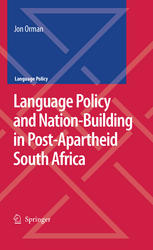

Most ebook files are in PDF format, so you can easily read them using various software such as Foxit Reader or directly on the Google Chrome browser.
Some ebook files are released by publishers in other formats such as .awz, .mobi, .epub, .fb2, etc. You may need to install specific software to read these formats on mobile/PC, such as Calibre.
Please read the tutorial at this link: https://ebookbell.com/faq
We offer FREE conversion to the popular formats you request; however, this may take some time. Therefore, right after payment, please email us, and we will try to provide the service as quickly as possible.
For some exceptional file formats or broken links (if any), please refrain from opening any disputes. Instead, email us first, and we will try to assist within a maximum of 6 hours.
EbookBell Team

4.7
16 reviewsThe urgent need to forge an inclusive, multi-racial, multicultural South African national identity has been one of the most dominant themes in post-Apartheid politics and society. With the realisation that many of the social problems which beset contemporary South African society are sociolinguistic in origin, the critical importance of language policy and planning for democratic ‘nation-building’ becomes evident. This book adopts a rigorous theoretical approach to the study of language policy and national identity, both in a general sense and with specific application to the sociolinguistic situation in South Africa. It also includes an entire chapter devoted to the issue of the status and role of Afrikaans in the post-apartheid era. Employing a strictly multi-disciplinary approach, the book draws on insights from a number of academic disciplines including sociolinguistics, the sociology of language, sociology, social psychology, political theory and social anthropology.
The book will be of considerable interest to a wide range of academic theorists and students whose work is either specifically concerned with, or touches upon, issues of language policy and national identity, as well as language planners and policymakers, language pedagogists and educational organisations, both within South Africa and beyond.